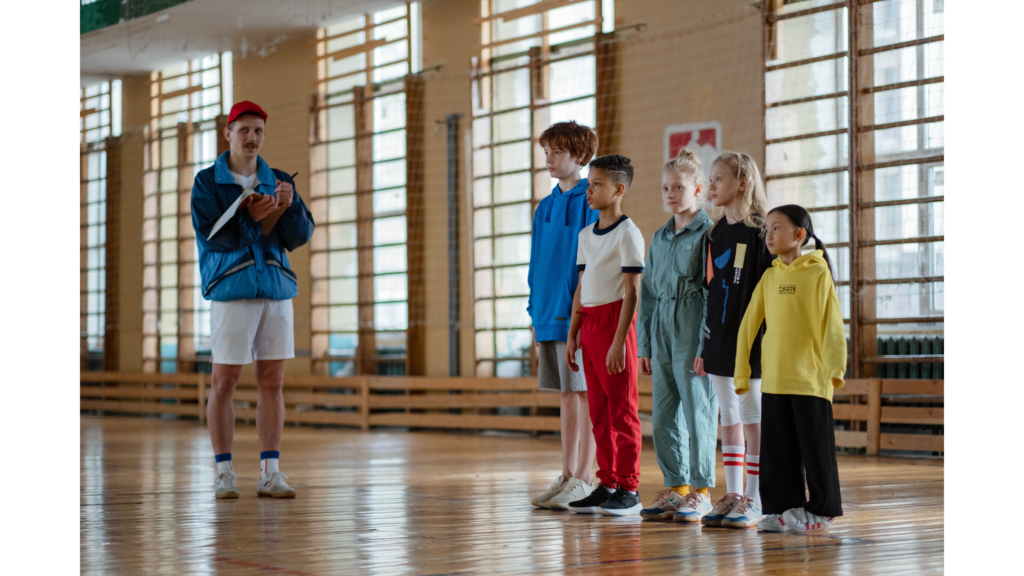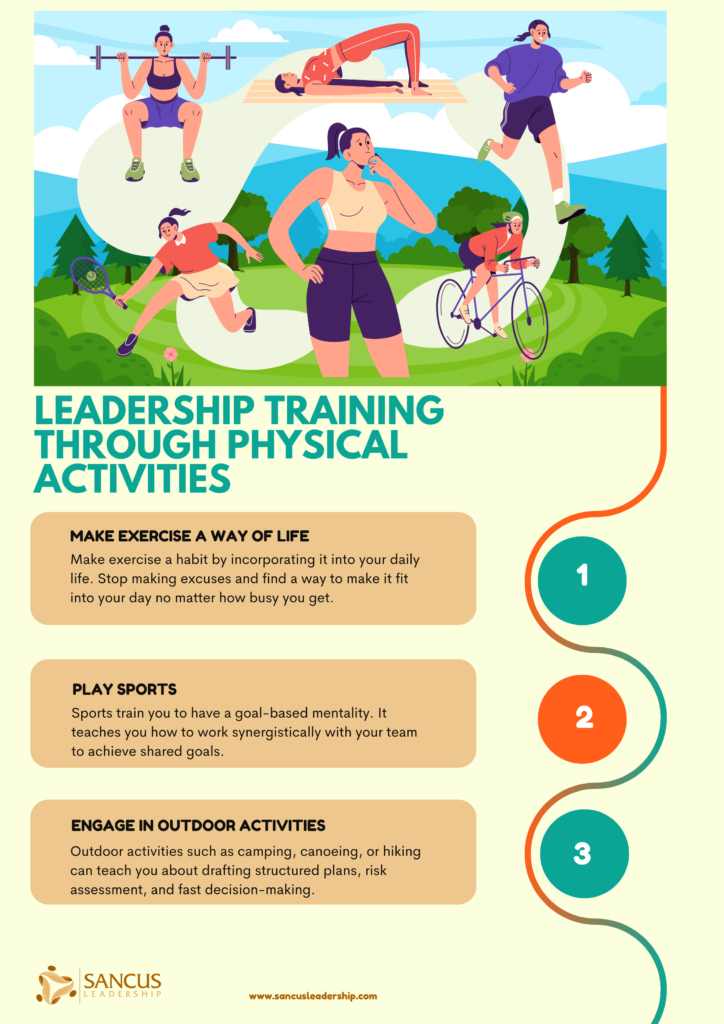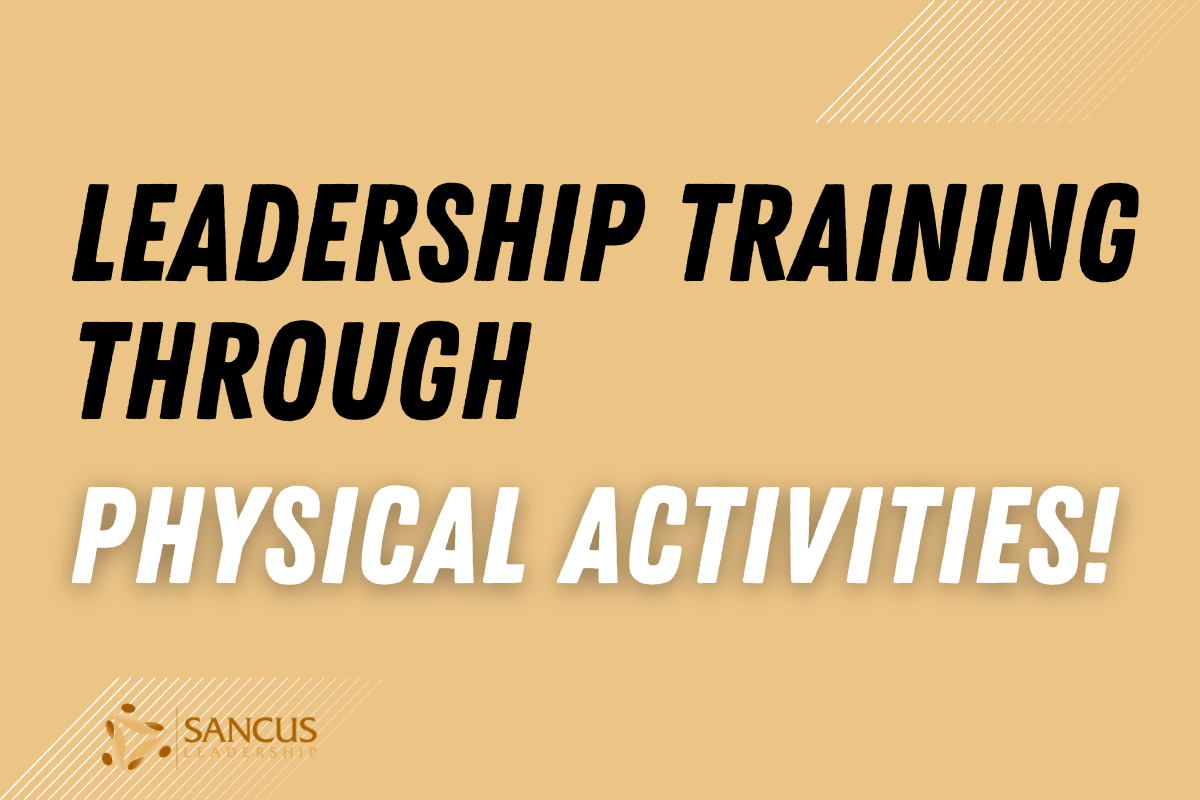Are you one of those people who see Physical Education merely as a filler subject in school, which only serves to release pent-up energy through wholesome and physically beneficial means? If so, you fail to realize that physical activities profoundly impact a person’s overall well-being. They have a strong influence when it comes to sharpening leadership skills.
Leaders can be trained through Physical Education since it influences how a person thinks and acts, especially when faced with challenges. Regular exercise, sports, and outdoor activities can affect vital aspects of leadership, such as communication, decision-making, strategic thinking, and ethics.
In this article, we will talk about the link between physical activities and leadership development. We will discuss the benefits I have seen while training military and civilian personnel. And what you can expect from incorporating exercise, sports, and outdoor activities in your routine, including physical, mental, and emotional gains. Let’s begin!
Is Physical Education a Good Training Ground for Leaders?

In a school setting, most of us see Physical Education merely as a form of exercise — an avenue for students to release excess energy, improve their physical strength, hone their skills in movement, and teach the value of sportsmanship. It’s typically viewed as just a minor subject.
However, Physical Education brings a lot more to the table than we give it credit for. In reality, it can also be a great way to teach students (and all of us) valuable skills that can make a difference in how they live their lives. Leadership skills, in particular, can be effectively learned through physical activities and exercise.
Without Physical Education, students won’t be exposed to these concepts:
- Teamwork: Sports activities teach the value of establishing camaraderie, collaboration, and teamwork, which are essential in becoming a valued team member.
- Decisiveness: Physical Education trains students to make spur-of-the-moment decisions that are sound and beneficial for the team — another valuable skill in a real-life business setting.
- Creativity and innovation: Playing sports encourages students to develop strategies that can help them win the game. In business, strategies are crucial in the efficient attainment of goals.
- Power and authority: The leadership skills of team captains are effectively developed by playing sports. They are trained in proficiently managing a diverse group of people, leveraging each person’s strengths, curtailing the repercussions of weaknesses, proper role delegation, and leading the team toward victory — similar to how a leader functions in a business team.
- Ethics: Sportsmanship is not all about winning the game — it’s about honorably pursuing victory by giving it your best shot. Potential leaders can learn about integrity, accountability, respect, and fairness through sports.
| Concept | Explanation |
| Teamwork | Sports activities teach the value of establishing camaraderie, collaboration, and teamwork, which are essential in becoming a valued team member. |
| Decisiveness | Physical Education trains students to make spur-of-the-moment decisions that are sound and beneficial for the team — another valuable skill in a real-life business setting. |
| Creativity and innovation | The leadership skills of team captains are effectively developed by playing sports. They are trained in proficiently managing a diverse group of people, leveraging each person’s strengths, curtailing the repercussions of weaknesses, proper role delegation, and leading the team toward victory — similar to how a leader functions in a business team. |
| Power and authority | The leadership skills of team captains are effectively developed by playing sports. They are trained in proficiently managing a diverse group of people, leveraging each person’s strengths, curtailing the repercussions of weaknesses, proper role delegation, and leading the team toward victory — similar to how a leader functions in a business team. |
| Ethics | Sportsmanship is not all about winning the game — it’s about honorably pursuing victory by giving it your best shot. Potential leaders can learn about integrity, accountability, respect, and fairness through sports. |
Why Physical Education Can Produce High-Quality Leaders

Physical activities are excellent for both the mind and the body. They have long been established to improve one’s overall physical well-being, mental health, and emotional stability.
Physical activities are excellent for both the mind and the body. They have long been established to improve one’s overall physical well-being, mental health, and emotional stability.
Physical activities are linked to:
- Healthier heart rate
- Improved muscle strength
- Lower cholesterol levels and blood pressure
- Better sleep quality
- Better immunity
- Increased energy
- Improved focus
- Improved concentration
- Reduced anxiety and stress
- Higher self-esteem
- Enhanced memory
- Improved mental health
- Improved brain function
The Link Between Physical Activities and Leadership Growth
The benefits you can reap from physical activities easily translate into how well you function as a leader.
Take a look at how the benefits of physical activities can translate into enhancing some of the most vital skills essential in effective leadership:
- Effective communication
- Better decision-making
- Enhanced problem-solving skills
- Proficient conflict resolution
- Increased self-awareness
- Improved creativity and innovation
- Improved job performance
- Increased productivity
- Enhanced ethical and moral standards
Leadership Training Through Physical Activities

The long and short of it is that regular physical exercise helps improve physical, emotional, and mental well-being, which translates into how much more effective you can be as a leader.
At Sancus Leadership, we stand by the influence of physical activities in developing better leaders. Book a call with us now to learn how you can hit two birds with one stone — have fun with your team and sharpen your leadership skills simultaneously!
Here are some ideas on how you can incorporate physical activities into your life so you can maximize its benefits on leadership development:

1. Make Exercise a Way of Life
Make exercise a habit by incorporating it into your daily life. Stop making excuses and find a way to make it fit into your day no matter how busy you get.
Make exercise a habit by incorporating it into your daily life. Stop making excuses and find a way to make it fit into your day no matter how busy you get.
Try to be more flexible. Physical activities don’t necessarily have to follow a strict schedule. You can exercise whenever you find some free time, any time of the day.
If your day is usually packed, short exercise stints scattered throughout the day are better than not engaging in physical activities. Walk to the office, take the stairs instead of the elevator, or hop on a stationary bike while reading up on some reports.
And if you are still making excuses why you can’t exercise, at least stop taking the elevator or escalator and instead start walking!
2. Play Sports
Sports train you to have a goal-based mentality. It teaches you how to work synergistically with your team to achieve shared goals.
It also teaches you about discipline and perseverance — that you must work hard and stay the course despite challenges and obstacles and that you must persevere in attaining your objectives no matter how tricky circumstances might get.
Most importantly, playing sports gives you opportunities to build your character. It encourages you to be more well-rounded since it provides opportunities for enhancing your sense of honor, responsibility, accountability, and integrity.
Team sports like soccer, volleyball, and basketball will teach you how to be a more effective and reliable team player, while sports like golf, tennis, and bowling can train you on the value of being goal-oriented, focused, and proficient in your specific field.
3. Engage in Outdoor Activities
Outdoor activities such as camping, canoeing, or hiking can teach you about drafting structured plans, risk assessment, and fast decision-making. They can also train you to communicate more effectively with your team, work collaboratively with others, and work toward achieving shared goals by banking on each other’s unique strengths.
Outdoor activities can also train you to be a more empathetic, practical leader with sharp improvisational skills to help the team move forward from even the trickiest of predicaments.
Outdoor activities can also train you to be a more empathetic, practical leader with sharp improvisational skills to help the team move forward from even the trickiest of predicaments.
In this TED talk by William Simon, Jr., he explains how Physical Education plays an important role in developing and transforming children to prepare them for bigger roles in the future.
Final Thoughts
A lot of people may not realize it, but physical activities have the potential to help us become better, more effective leaders. They help make us physically healthier to have more energy to get things done. They also help improve our mental and emotional wellness so we are better equipped to handle challenges and obstacles that will undoubtedly come our way.
The bottom line is physical activities are great tools for making leaders more proficient, reliable, skilled, and ethical. Sharpening these crucial leadership aspects can significantly contribute to making any business team more efficient in reaching its goals.



